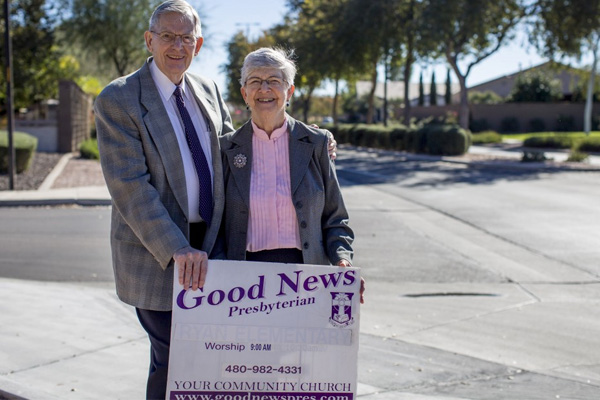
Source: Alliance Defending Freedom
The Supreme Court is being asked to intervene in a case taking place in Arizona, where a small church has brought a suit against the town of Gilbert.
On one side of the battle is the town of Gilbert, which argues that there should be very stiff limits on the number of small directional signs often seen on roadways as well as how long they can stay up. Since the distinction has been recently used against the Good News Presbyterian Church, they argued for being treated as less important than any other community group, politician, or even citizens who hold yard sales.
The Law in Gilbert, Arizona
Currently, there is a law in place in the city regarding small signs. They must be no larger than six square feet, and must be put up 12 hours or less in advance and removed one hour after the event concludes. However, there is a law that allows political candidates to place their signs in just about any public space, allows them 32 square feet, and can remain in their place for up to five months at a time.
The Good News Community Church
Being that the Good News Community Church only has about 30 members, they do not have a permanent meeting place and frequently go to different areas and private residences to hold meetings. Their argument is the small signs are necessary to direct individuals to their meetings, and they need more time to place and remove the signs. Moreover, the fact that they are being slighted while political messages are allowed to linger has prompted the Supreme Court to take a more favorable look at the small church’s argument.
The Most Recent Developments
When the Supreme Court recently heard the opening of the case, there were many ideas explored for their feasibility. The Good News Community Church leaders suggested signs could be limited to a certain number on a given block. This idea was quickly shunned by lawyers for the town, who suggested this could lead to less free speech in the town.
In particular, Justice Roberts asked the town mayor if he places specific favor on some signs over others, a notion that was denied. It boiled down to the idea that the directional signs could not remain up as long as those signs spoke about a specific ideology. Although the lawyers for the town of Gilbert, Arizona did note that the signs could be up longer if they did not give directions, it seemed to be a poor distinction for both liberal and conservative members of the Supreme Court. Currently, it seems they are leaning in the Church’s favor, but the case will not be determined until this summer.
